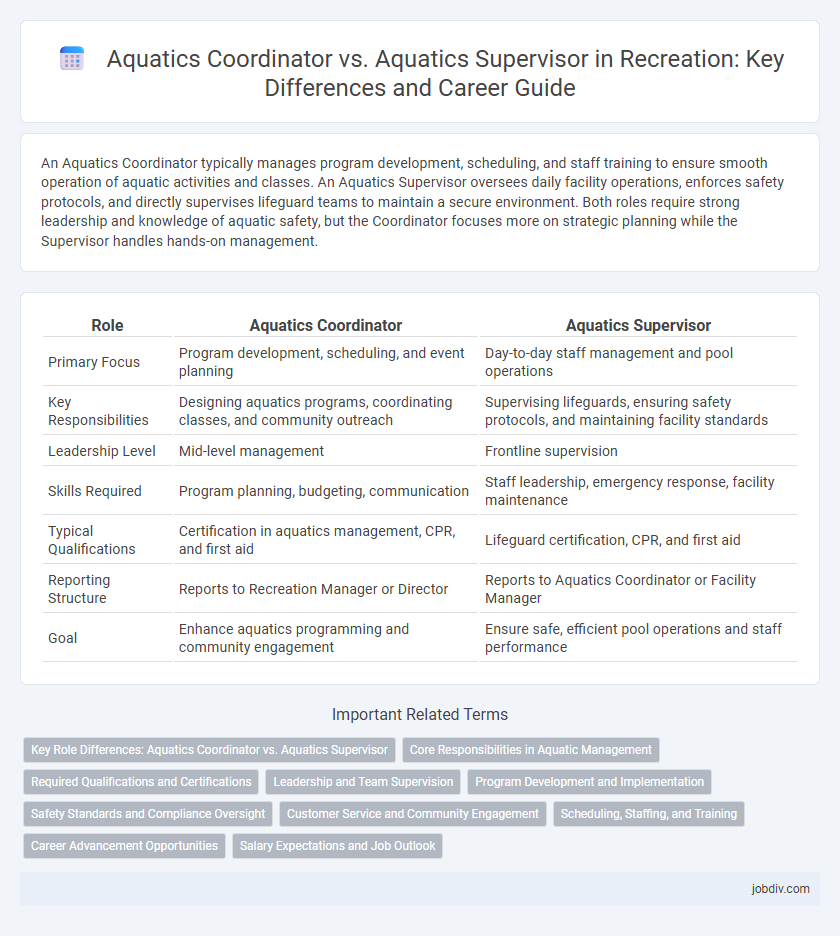An Aquatics Coordinator typically manages program development, scheduling, and staff training to ensure smooth operation of aquatic activities and classes. An Aquatics Supervisor oversees daily facility operations, enforces safety protocols, and directly supervises lifeguard teams to maintain a secure environment. Both roles require strong leadership and knowledge of aquatic safety, but the Coordinator focuses more on strategic planning while the Supervisor handles hands-on management.
Table of Comparison
| Role | Aquatics Coordinator | Aquatics Supervisor |
|---|---|---|
| Primary Focus | Program development, scheduling, and event planning | Day-to-day staff management and pool operations |
| Key Responsibilities | Designing aquatics programs, coordinating classes, and community outreach | Supervising lifeguards, ensuring safety protocols, and maintaining facility standards |
| Leadership Level | Mid-level management | Frontline supervision |
| Skills Required | Program planning, budgeting, communication | Staff leadership, emergency response, facility maintenance |
| Typical Qualifications | Certification in aquatics management, CPR, and first aid | Lifeguard certification, CPR, and first aid |
| Reporting Structure | Reports to Recreation Manager or Director | Reports to Aquatics Coordinator or Facility Manager |
| Goal | Enhance aquatics programming and community engagement | Ensure safe, efficient pool operations and staff performance |
Key Role Differences: Aquatics Coordinator vs. Aquatics Supervisor
The Aquatics Coordinator primarily focuses on program development, scheduling, and community outreach to enhance aquatic services, ensuring a varied and engaging recreational experience. The Aquatics Supervisor oversees daily pool operations, manages lifeguard staff, enforces safety regulations, and coordinates maintenance to maintain a safe aquatic environment. While the coordinator drives strategic planning and public engagement, the supervisor emphasizes operational efficiency and on-site safety management.
Core Responsibilities in Aquatic Management
Aquatics Coordinators focus on program development, scheduling, and instructional staff training to ensure the delivery of safe and engaging aquatic programs. Aquatics Supervisors oversee daily pool operations, enforce safety protocols, and manage emergency response procedures to maintain a secure aquatic environment. Both roles require strong leadership in aquatic facility management, but Coordinators emphasize program planning while Supervisors prioritize operational oversight.
Required Qualifications and Certifications
Aquatics Coordinators typically require certifications in CPR, First Aid, and Lifeguard Training, often holding an associate or bachelor's degree in recreation management or a related field. Aquatics Supervisors usually need advanced certifications such as Water Safety Instructor (WSI) and Certified Pool Operator (CPO), along with several years of experience in aquatic program management. Both roles demand strong leadership skills and a thorough understanding of local safety regulations and emergency response protocols.
Leadership and Team Supervision
Aquatics Coordinators focus on program development, staff training, and ensuring safety protocols are followed, often leading teams in developing aquatic activities and lessons. Aquatics Supervisors prioritize daily operational oversight, managing lifeguard teams, enforcing compliance with safety regulations, and handling facility maintenance. Both roles require strong leadership skills and the ability to motivate and supervise aquatic staff to maintain high standards of safety and customer service.
Program Development and Implementation
An Aquatics Coordinator specializes in designing and developing swim programs tailored to diverse skill levels, emphasizing curriculum innovation and community engagement. An Aquatics Supervisor focuses on overseeing the execution of these programs, ensuring safety protocols, staff management, and facility operations align with organizational standards. Both roles collaborate to enhance program effectiveness, but the Coordinator leads program development while the Supervisor ensures successful implementation.
Safety Standards and Compliance Oversight
Aquatics Coordinators develop and implement safety standards, ensuring all aquatic activities comply with local, state, and federal regulations to maintain a secure environment. Aquatics Supervisors oversee day-to-day operations, actively monitoring compliance with established safety protocols and immediately addressing potential hazards. Both roles collaborate to enforce lifeguard certifications, emergency response procedures, and facility inspections, promoting consistent regulatory adherence and swimmer safety.
Customer Service and Community Engagement
Aquatics Coordinators specialize in direct customer service by organizing swim programs and ensuring participant satisfaction through personalized support and timely communication. Aquatics Supervisors emphasize community engagement by overseeing facility operations and fostering partnerships with local organizations to promote aquatic health and safety. Both roles prioritize creating positive experiences, but Coordinators focus on individual interactions while Supervisors manage broader community involvement.
Scheduling, Staffing, and Training
Aquatics Coordinators focus on developing and implementing detailed scheduling plans to optimize facility usage and class offerings, while Aquatics Supervisors handle day-to-day staff assignments and ensure compliance with safety standards. Coordinators design comprehensive training programs to enhance staff skills and certifications, whereas Supervisors provide direct oversight and on-the-job training to maintain operational efficiency. Both roles collaborate to balance staffing needs and employee development within aquatic recreational settings.
Career Advancement Opportunities
Aquatics Coordinators typically manage day-to-day aquatic programs and staff, providing hands-on leadership and operational oversight. Aquatics Supervisors hold higher responsibility, often overseeing multiple coordinators, ensuring compliance with safety regulations, and managing departmental budgets, which offers broader strategic influence. Transitioning from Coordinator to Supervisor enhances career advancement by expanding management experience and opening pathways to senior recreation management roles.
Salary Expectations and Job Outlook
Aquatics Coordinators typically earn between $40,000 and $55,000 annually, while Aquatics Supervisors can expect salaries ranging from $50,000 to $70,000 due to increased responsibilities in staff management and safety compliance. The job outlook for both positions shows steady growth, driven by rising demand for aquatic programs in community centers, schools, and recreational facilities. Aquatics Supervisors generally have better advancement opportunities and higher salary potential linked to their supervisory experience and certification levels.
Aquatics Coordinator vs Aquatics Supervisor Infographic

 jobdiv.com
jobdiv.com